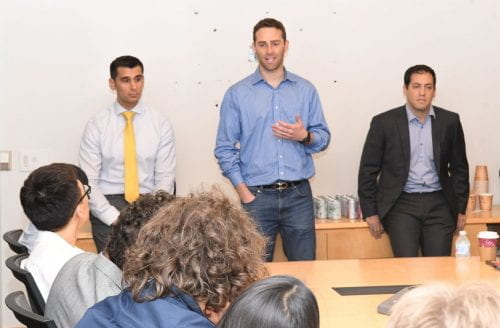
 As the final stop on their trek, first-year Baker Program in Real Estate students visited Rialto Capital’s new office on Biscayne Boulevard in downtown Miami. This visit was coordinated through the Baker Program’s fortunate connection with Director Michael Mashioff (ILR ‘04). Rialto was founded in 2007 as a subsidiary of Lennar Corporation, the largest home-builder in the U.S. In 2018, Stone Point Capital – a Greenwich-based private equity fund run by Goldman Sachs’ former CEO Steve Friedman – purchased Rialto. The Rialto platform invests in real estate across the capital stack, including floating rate senior loans, mezzanine loans, B-Notes, and direct real estate, with the most prevalent component of their investment platform being the CMBS B-Pieces.
As the final stop on their trek, first-year Baker Program in Real Estate students visited Rialto Capital’s new office on Biscayne Boulevard in downtown Miami. This visit was coordinated through the Baker Program’s fortunate connection with Director Michael Mashioff (ILR ‘04). Rialto was founded in 2007 as a subsidiary of Lennar Corporation, the largest home-builder in the U.S. In 2018, Stone Point Capital – a Greenwich-based private equity fund run by Goldman Sachs’ former CEO Steve Friedman – purchased Rialto. The Rialto platform invests in real estate across the capital stack, including floating rate senior loans, mezzanine loans, B-Notes, and direct real estate, with the most prevalent component of their investment platform being the CMBS B-Pieces.
According to Director Brian Klein, Rialto is unique because it manages all types of commercial real estate assets across all 50 states. These assets include hotels, industrial, offices, retail, self-storage, and multifamily. In addition, Rialto offers an exhaustive list of in-house services, ranging from underwriting initial investments to being the point of contact for borrowers and managing foreclosure activities in the CMBS universe. David Jervasi, Senior Vice President of Finance, emphasized the importance of this diversification, which provides Rialto a competitive advantage. With an integrated investment and asset management structure, Rialto controls each aspect of the investment process, unlike comparable firms in the market.
 With a conscious effort to internalize all services, Rialto enjoys some notable benefits as compared to its competitors. Servicing and monitoring deals in-house gives Rialto preemptive insights into potential issues (e.g. retailers filing for bankruptcy in spite of regular payments on loans). This allows Rialto to compile comprehensive data to create an information loop within the company that will allow for informed decisions with respect to other similarly situated properties. Rialto’s clients are often impressed by the attention to detail given to small-scale issues as its team underwrites large-scale deals. This strategy is important to Rialto as it does not have to rely on third party asset managers. Being self-sufficient allows teams to be internally answerable and to avoid charging clients multilayered fees.
With a conscious effort to internalize all services, Rialto enjoys some notable benefits as compared to its competitors. Servicing and monitoring deals in-house gives Rialto preemptive insights into potential issues (e.g. retailers filing for bankruptcy in spite of regular payments on loans). This allows Rialto to compile comprehensive data to create an information loop within the company that will allow for informed decisions with respect to other similarly situated properties. Rialto’s clients are often impressed by the attention to detail given to small-scale issues as its team underwrites large-scale deals. This strategy is important to Rialto as it does not have to rely on third party asset managers. Being self-sufficient allows teams to be internally answerable and to avoid charging clients multilayered fees.
The four core departments under Rialto’s Asset Management department are CMBS Performing Loans, CMBS Loan Workout, Real Estate Asset Management (“REO”), and Collateral Surveillance. The CMBS Performing Loans department focuses on various real estate transactions such as leasing matters, property sales, and hotel franchise agreements. The Loan Workout department, on the other hand, explores the investors’ options in the case of a default and analyses the degree to which loan terms may be modified before a foreclosure is imminent. The Asset Management team (REO) adopts a capital improvement strategy, wherein it assesses, manages, and liquidates real estate owned by Rialto or its subsidiaries to then determine the optimal holding period and market value of each asset. Finally, the Collateral Surveillance team monitors risks associated with Rialto’s CMBS bond investments. The successful performance of this department is essential in making Rialto a market leader as it studies the effect of macro-level issues (e.g. natural disasters) on commercial real estate cash flows.
CMBS loans are an important and growing part of the debt universe. The benefit of CMBS is that these loans are usually non-recourse and allow fixed interest rates at loan origination, which is attractive to borrowers. On the other hand, CMBS loans can be restrictive for borrowers and the tax implications for investors can be complicated. CMBS loans are generally appropriate for built properties with solid past performance, which helps in accurately underwriting the asset and projecting cash flows.
 For Rialto, on the fund business and capital raising side, foreign investors play a key role, especially for a company in an international market such as Miami. This part of the business focuses heavily on long-term relationships with players including (but not limited to) pension funds, high net worth individuals, insurance companies, and sovereign wealth funds in countries like Singapore and Japan. Mr. Mashioff explained the concept of “sticky capital,” wherein trust is built with an institutional partner who repeatedly commits capital to the sponsor, causing smaller investors to follow in its footsteps. In repayment of Rialto’s good faith partnership, an investor made a significant investment in its fund after a decade of Rialto’s relationship-building and superior performance.
For Rialto, on the fund business and capital raising side, foreign investors play a key role, especially for a company in an international market such as Miami. This part of the business focuses heavily on long-term relationships with players including (but not limited to) pension funds, high net worth individuals, insurance companies, and sovereign wealth funds in countries like Singapore and Japan. Mr. Mashioff explained the concept of “sticky capital,” wherein trust is built with an institutional partner who repeatedly commits capital to the sponsor, causing smaller investors to follow in its footsteps. In repayment of Rialto’s good faith partnership, an investor made a significant investment in its fund after a decade of Rialto’s relationship-building and superior performance.
As parting advice, Mr. Mashioff advised the first-year Baker students to learn and master a specific set of skills, including financial analysis and accounting fundamentals, to stay up-to-date with current events, and to focus on communication skills. On this latter point, the ability to read, comprehend, distill, and present information in a digestible manner to senior management is an essential skill.

